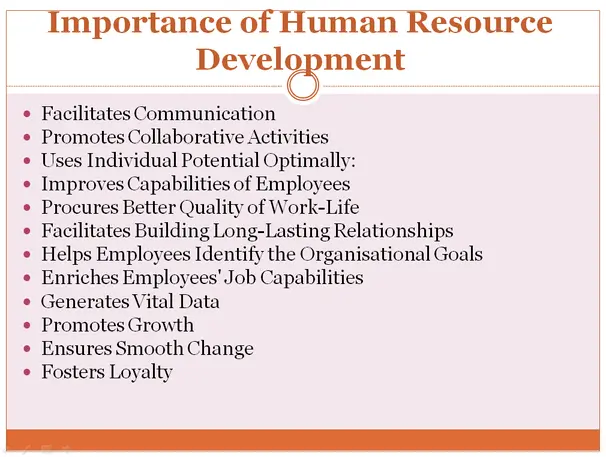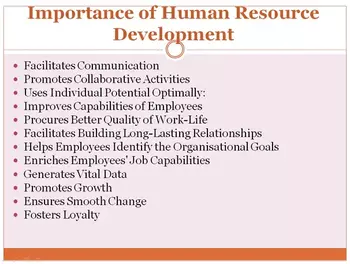Table of Contents:
- Importance of HRD
- Approaches of HRD
Importance of HRD
The importance of HRD cannot be neglected in today’s business environment. A well-formulated HRD strategy provides a business with many advantages, including a positive work culture that may drive innovation, organisational development, growth, and a competitive advantage. Human Resource Development enhances employees’ skills, knowledge, and capabilities in their work environment. It attracts and retains talented employees.
The following factors highlight the importance of HRD function in an organisation:
1) Facilitates Communication
HRD department facilitates meaningful two-way interaction between management and employees, and among employees. Such communication ensures smooth work systems and departments in an organisation, as members understand each other better, resulting in minimum friction and paving the way towards a healthy relationship between the management and employees and among employees.
2) Promotes Collaborative Activities
HRD initiative encourages healthy teamwork by creating an environment of trust among members of the organisation. The positive traits of individual members are integrated to contribute to the success of any project.
3) Uses Individual Potential Optimally
Human resources are the backbone of any organisation. HRD initiative strives to use the capability of every individual to the fullest through training programs, provision for rewarding talented employees, etc.
4) Improves Capabilities of Employees
The job of an individual requires various skills. HRD systems aim to ensure that employees acquire skills like out-of-the-box thinking, healthy communication skills adaptability to changing working environments, problem-solving, etc.
5) Procures Better Quality of Work-Life
HRD mechanisms also provide facilities like sports, equipment gymnasiums, libraries, medical insurance schemes, etc. Such initiatives go a long way in providing a better quality of work-life for employees.
6) Facilitates Building Long-Lasting Relationships
HRD systems aim to create an environment conducive to building long-lasting relationships. Even if for any reason, an employee leaves an organisation, he does so, without any feeling of bitterness and maintains cordial relationships with colleagues and the management.
7) Helps Employees Identify the Organisational Goals
HRD policies convince employees that their growth is linked to and possible only to achieving the organisational goals. The HRD department does so by understanding clearly both the employees’ needs and the organisational goals and framing policies accordingly.
8) Enriches Employees’ Job Capabilities
Among HRD policies, training and development of employees are the top priorities. The HRD department facilitates training programs that upgrade employees’ present skills, as well as programs that help in acquiring newer skills.
9) Generates Vital Data
HRD department regularly generates and compiles data that help in formulating policies to achieve HRD objectives.
10) Promotes Growth
HRD creates an environment in which the employees are confident that their interests are being taken care of. Such caring includes counselling for career planning and succession needs. This environment ensures a frictionless blending of individual ambitions with organisational goals.
11) Ensures Smooth Change
HRD prepares employees to smoothly adapt to new strategies, working conditions and skill requirements that are necessitated by a change in organisational goals.
12) Fosters Loyalty
HRD matches the performance of employees with adequate recognition by way of impartial rewards. With the nurturing environment created by HRD, employees feel secure and optimistic and hence are encouraged to be loyal and committed to the organisation.

Approaches of HRD
The common goal in all the approaches of HRD is improving organisational performance through initiatives that qualitatively enhance the human resources of an organisation.
Following are the three typical HRD approaches adopted by established organisations:
1) Production-Centred Approach
This approach to human resource development directly links an employee’s job performance to the organisation’s performance. In this approach, which is the most commonly used approach by HRD departments, an employee’s training and development activities are sponsored by the organisation to enhance his skills and consequently the organisation’s production-based performance.
After all, productivity has a significant effect on an organisation’s profitability. This approach is beneficial to the employee as well because, with improved technological skills, an employee can perform his job more efficiently with less effort. This approach has also been accepted by both theoreticians and practitioners of this field.
2) Person-Centered Approach
In this approach, the focus is on the employee and not on production as in the production-centred approach; however, the goal of both approaches is the same, i.e., to enhance organisational performance. Using this approach, HRD policies aim to train and develop employees as a person; not only as a workers. Personal traits of the employees are developed positively. As a result, there is an improvement in the worker’s efficiency, which in turn, enhances his productivity.
Thus, this approach has an indirect effect on organisational performance, therefore, this approach is felt to be less attractive to employers. Motivation for the employees under this approach is that, with a confident frame of mind and an improved set of skills, they see better prospects for themselves. From the organisation’s perspective, this approach is beneficial because a satisfied employee is a committed and loyal employee.
3) Problem-Solving Approach
Every organisation encounters problems daily during various activities and processes. For sound organisational performance, all problems must be solved in the shortest possible time after they arise as problems can hamper the progress of the organisation.
Hence, this HRD approach aims to improve the problem-solving skills of employees. Knowing the problem and its solution facilitates faster decision-making, resulting in the enhancement of organisational efficiency. Armed with better problem-analysing and problem-solving skills, employees also become capable of making independent decisions, without referring the problems to their superiors.
You May Also Like :-
Methods of Management Development
Workers Participation in Management
Features of Management Development
Human Resource Development Mechanisms
Process of Human Resource Planning
360 Degree Performance Appraisal
Limitations of Human Resource Planning
Difference between Personnel Management and HRM
